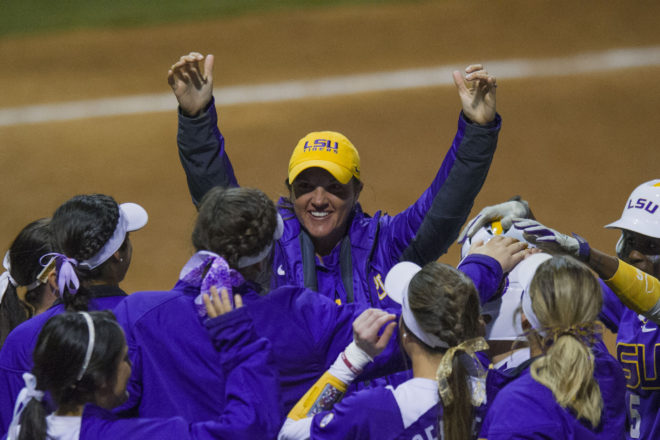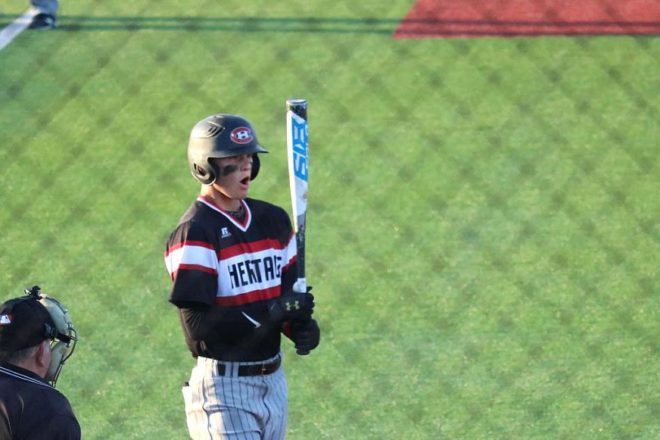Earlier this week, the NCAA released the Division I Men’s College Baseball World Series Tournament Bracket.
In the college baseball world this is more commonly known as “The Road to Omaha”.
Tomorrow, June 4 starts the regionals where 64 teams will compete in 16 different 4 team brackets, narrowing themselves down to the following weekends 8 super regionals where 16 teams will battle and give us the 8 teams who will compete in Omaha, Nebraska vying for the National Championship.
Every college baseball player dreams of this time of year and competing in the “The Road to Omaha”.
But, in order to win, each team will have to treat these regional and super regional games like any other game or practice.
Nothing special.
Even though it’s crazy special.
Why?
Because champions don’t rise to the occasion, they sink to their training. Champions in college baseball are made months before we know who will be traveling on The Road to Omaha. Championships are won when players know how to show up on the biggest stage with precision like focus, competing one pitch at a time like they’ve been trained all year.
The final game of the College World Series is exciting. I should know I’ve been a mental performance coach with teams in the dugout for several of them.
They were all memorable, but I hold a special memory from the 2004 College World Series.
In 2004, the California State University, Fullerton baseball team (I graduate from there with my MS in Applied Sport Psychology in 2003) completed the first half of their season with a 15-16 record. At this midway point in the season, the team made the collective commitment to turn their season around with a re-commitment to the execution of the fundamentals, an intense focus on both physical and mental preparation and on living in the moment, one day, one pitch, one breath at a time.
George Horton was the head coach on that 2004 team and I had the privilege of being on his staff in 2002 and 2003 as a graduate assistant. Coach Horton was a firm proponent of competing every day in practice with an “Omaha Like” attention to detail, energy and effort. He wanted the Titans to get after it each day in practice as if it were a national championship game. He worked to replicate championship intensity in practice with proper structure and commitment to the preparation process. He said often that you need to treat today like it’s the biggest game of your life so when you get to the biggest game of your life (the NCAA National Championship), you can treat it like any other game or any other day you have had all year.
So, when the Titans reached the final game that season, they were prepared.
To drive that point home, Coach Horton brought a water bottle filled with dirt from the team’s field in Fullerton. Before the start of the College World Series, the team went out onto the field and sprinkled that Fullerton dirt on the mound and in the batter’s box which served as a reminder to his players of all the hard work and preparation put in every day of practice back home.
Performance on the biggest stage of college baseball was no different than back home in Fullerton.
The game remains the same anywhere you play – nothing changes.
90 feet between the bases. 60 Feet 6 inches from the mound the the plate. 4 balls, 3 strikes, 3 outs. Simple
Cal State Fullerton won the College World Series Championship that year largely because they practiced like champions that entire year and were resilient and unyielding when they started that season with the worst record in school history through 31.
Are you coaching your teams everyday as if you were at the College World Series on that day?
Are you bringing and demanding that type of attention to detail, energy and effort?
If not, start today.
Here are some tips I’ve learn from coaches who have won in Omaha like Coach Horton (2004), Vanderbilt’s Tim Corbin (2014, 2019), Oregon State’s Pat Casey (2006, 2007, 2018), Coastal Carolina’s Gary Gilmore (2016), South Carolina’s Ray Tanner (2010, 2011), LSU’s Skip Bertman (1991, 1993, 1996, 1997, 2000) and the late Augie Garrido of Cal State Fullerton (1979, 1984, 1995 and The University of Texas (2002, 2005).
#1 Teach your players the Mental Game of Baseball, it’s a set of skills that can be learned.
I have developed a curriculum that I was first introduced to at Cal State Fullerton under the guidance of Dr. Ken Ravizza. Ken was my graduate school advisor, mentor and most of what I teach today in the mental game I learned from him. His book Heads Up Baseball changed my life when I picked it up on July 4, 2000 during my Jr. year of college at The University of Vermont where I was a struggling right handed pitcher. His teachings have had huge impact on my life, so much that I have a tattoo of his face on my heart, literally. I’ve created a FREE 60minute Baseball Masterclass where I teach what I learned from Ken and what I’ve used with many of the programs mentioned above.
I also open up an opportunity for coaches only two times a year which to master the mental game and what you learn is largely based on what I have learned from working with, studying, interviewing and observing these great coaches. It’s my Mental Performance Mastery (MPM) Certification Course and you can learn the drills and skills these championship teams use on a daily basis to win. These drills are used by top level D1 teams who repeatedly get to Omaha and win. You can learn more about The MPM Coaches Certification here:
#2 Have game-like practices
As we talked about above, bringing championship game and “Omaha” intensity to every practice is critical if you are going to win in the post-season. Baseball players love competition, so make sure everything you do ends with a declared winner and a loser/learner. Bring in umpires when you scrimmage. Use a scoreboard whenever you can. Have two different colored jerseys. Use two different dugouts. Keep intra-squad scrimmage stats. Do what ever you can to make practice more game like so you can in-turn make the game more practice like.
#3 Pay extreme attention to the details
Excellence in small things brings excellence in all things. Have a standard uniform for practice. All the players should look the same. I’m amazed at how often this just isn’t the case in baseball at the youth and high school level. Practice uniforms as an example of attention to detail (#ATD) will foster the we over me mentality championship teams must have and work to create uni-form, ONE FORM during your entire season. You also want to increase the tempo and pace of practices. Players on the field should be running into the dugout when the inning is over and immediately watch the opposing pitcher warm up. The more you can watch the pitcher, the sooner you can make a plan for the at-bat. Running off the field at practice is intense, Vanderbilt and their great coach Tim Corbin measures this. Erik Bakich at Michigan who was 1 win away from being a National Champion in 2019 measures this. But that’s what makes the final game of the world series seem “not so special”. The team has been working at an intense level all year. Just know you don’t step up or rise to the occasion, you sink to your training.
It’s not intense for them… it’s normal.
#4 Measure Everything because Measurement = Motivation.
Give your players a journal and incorporate time within the practice to record their performance and reflect using a well better how or start stop continue process. Simply have your players write down after practice what they did well, what they want to do better and how they can go about doing that. Or, you can have them write down what they want to start doing, stop doing and continue doing the next time out on the field. This reflection process is most often missing from the teams that fall short of their potential and a cornerstone in the process of teams that win. Reflection is where the learning happens and the team that learns the most and learns the fastest has a significant competitive advantage.
Under the premise that rewarded behavior becomes repeated behavior and measurement is motivation, points can be are earned for a player’s effort and execution of particular skills rather than just points for getting a hit or striking a batter out.
Use process-based scoring systems during practice to highlight particular skills in which the team and players must improve.
Start with one particular skill at a time. As players familiarize themselves with the framework of the system you have implemented, then introduce and highlight more skills to monitor.
This process-based scoring system is, like all systems of preparation, one of steady progression. Eventually you can award points for aspects of competing one pitch at a time that you want to emphasize like winning the 1-1 count, a hard hit ball or giving a hard 90 down the line.
I encourage you to watch the NCAA tournament as much as you can, especially the College World Series in Omaha. Look carefully and you will see most championship dugouts with similar behavior. Because champions are developed. Success leaves clues. There is a system and a process to how these teams are doing what they are doing. Yes they have talent.. The power 5 conference teams are littered with talent. Any team who wants to bring home the trophy and dog-pile in Omaha has to have routines and processes already in place long before their bus pulls into TD Ameritrade Park.
Follow along with me throughout June and I highlight the routines and fundamentals of the Mental Game these championship level coaches instill in their players.
For today I’ll leave you with this question ….
What are your program’s core principals and core values?
If someone were to come watch your team play, would they be able to easily identify what your program values are by how you compete?
If you can’t name them, and it’s not easy to identify them with how you compete, then you’ll want to tune into the next article about Leading Champions. Because any coach who’s held the championship trophy has a defined set of values. He can name them. The players can name them. Heck, even their fanbase and the walls in the locker room can tell you what is valued in the program.



